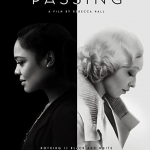A young boy and his working class family experience the tumultuous late 1960s.
(Watch for our recent interview with the stars and Branagh!)
Chuck says:
Were I given the opportunity to make a film based on a part of my young life, I can only hope it would half as beautiful as Kenneth Branagh’s “Belfast,” a semi-autobiographical account of the actor/director’s ninth year, a tumultuous time for his family and the titular town. Genuinely funny and effortlessly poignant, the film is not only a tribute to Branagh’s family but the citizens of the city, a resilient community that’s endured more than its share of social strife, its inhabitants the salt-of-the -earth, enduring hardships with a sense of grace, humor and compassion.
Branagh wastes no time as the film’s very first scene brutally introduces us to the social unrest that would ultimately uproot Buddy’s (Jude Hill) family, the precocious nine-year old finding himself in the middle of a terrorist act committed by a faction of Protestants intent on driving out the city’s Catholic citizens. As his father (Jamie Dornan) is often absent, forced to work in London due to local unemployment, much of the young man’s upbringing falls on the shoulders of his mother (Caitriona Balfe), as well as his loving grandparents (Ciaran Hinds and Judi Dench).
As coming-of-age stories go, the film covers many of the typical events that occur in a young boy’s life – experiencing his first crush, struggling with school, wrestling with adult concerns that are dropped in his lap. Yet, Branagh’s able to bring his cherished, personal experiences to the project, making Buddy a very appealing and relatable young hero. The filmmaker’s affinity for the power of catharsis and escapism provided by movies and theater is front and center, as we see Hill’s wonderfully expressive face rapt with astonishment as he watches “High Noon,” “One Million Years B.C.” or many of the other movies referenced throughout.
More moving is the existential crisis he faces, the fiery Protestant priest of his local perish having put the fear of God in him regarding the fate of his eternal soul. Taking the right path or the wrong one is a dilemma that haunts him, a decision he’s forced to make throughout as circumstances arise that force him and his entire family to take stock of what truly matters to them and how far they’ll go to keep what they love.
The entire cast is wonderful, bringing a sense of intimacy to each of their roles that convinces the viewer they’re seeing the most private and honest moments that occur in this tight-knit family. Dornan and Balfe are fiery and passionate in their interactions, the characters’ pasts obviously in the forefront of their minds. There’s a familiarity between them that’s palpable, their fights and moments of understanding both a product of the deep understanding they have of one another. Not surprisingly, Hinds and Dench are equally effective, the old married couple aware of the trials their children and grandchildren are grappling with, their knowing perspective one only time can provide.
There’s an intimacy and tenderness to “Belfast” that separates it from other films of its ilk, Branagh laying bare his most precious memories for all to see. And while there may be the temptation to dismiss this as a vanity project, there’s a universality to the film that’s impossible to escape. The troubles Buddy and his family must contend with, though they may manifest themselves in different forms, our are struggles as well. The sacrifice those who love us make for our own well-beings is the greatest of gifts and more than anything, with “Belfast” Branagh has composed a sincere and moving “thank you” to his parents and their courage.
Pam says:
“Belfast” may be Branagh’s best film to date as a love letter to Ireland, to Belfast, and to the roots that connect us to our friends and most importantly to our family.
To read her review in its entirety, go to RHR




